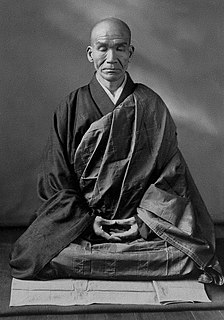A Quote by Kodo Sawaki
Gain is delusion; loss is enlightenment.
Quote Topics
Related Quotes
Each river is different, but they all eventually lead to the ocean. No matter what we’re doing or when, or whether it brings us happiness or remorse, gain or loss, we’re all on our individual paths to enlightenment. Even when we’ve done something we consider wrong, we’re still on our path to enlightenment.
Calculating people are contemptable. The reason for this is that calculation deals with loss and gain, and the loss and gain mind never stops. Death is considered loss and life is considered gain. Thus, death is something that such a person does not care for, and he is contemptable. Furthermore, scholars and their like are men who with wit and speech hide their own true cowardice and greed. People often misjudge this.
Enlightenment is construed as seeing things as they really are rather than as they appear; it is a direct insight into, and discernment of, the nature of reality that is apprehended only by wisdom, which transcends and is prior to the activity of discriminative thought. In this view, delusion is defined as all that is opposed to enlightenment.
As there is no worldly gain without some loss, so there is no worldly loss without some gain; if thou hast lost thy wealth, thou hast lost some trouble with it; if thou art degraded from thy honor, thou art likewise freed from the stroke of envy; if sickness hath blurred thy beauty, it hath delivered thee from pride. Set the allowance against the loss, and thou shalt find no loss great; he loses little or nothing, that reserves himself.






























